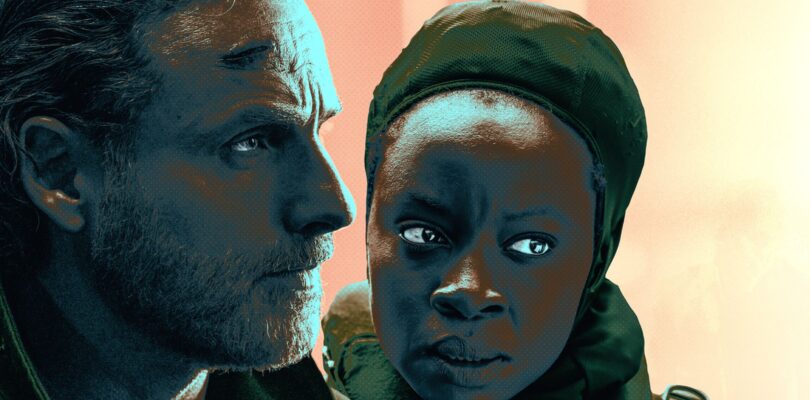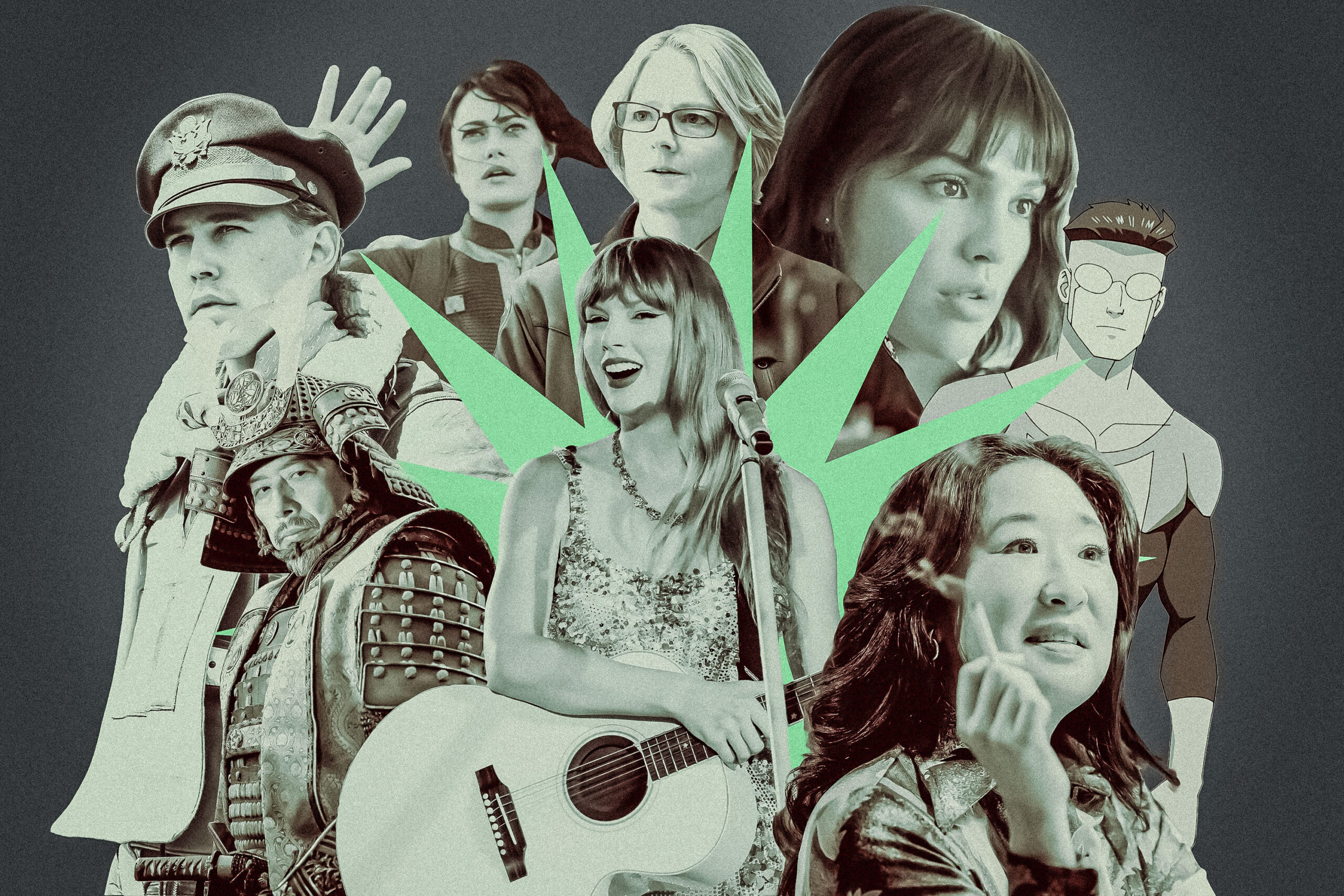While the finale for the latest ‘Walking Dead’ spinoff, ‘The Ones Who Live,’ feels like a great place to let the franchise rest, will AMC let the undead lie?
AMC/Ringer illustration

“I won’t stop,” Rick Grimes declares in the first episode of The Walking Dead’s latest spinoff, The Ones Who Live. In another scene from the premiere, we hear his voice-over narration of a passage from a letter he’s writing to Michonne: “I thought about ending it, just stopping it all. … I couldn’t do it.” The theme of Rick and Michonne’s (a.k.a. Richonne’s) relentlessness, indefatigability, and refusal to accept a conclusion to their saga extends throughout the six-episode season. “You two together—you are unstoppable,” another Walking Dead veteran, Jadis, tells Rick in Episode 5. In the finale, another adversary orders Rick to “keep going,” shortly after Rick refers to his and Michonne’s “unstoppable life,” and shortly before Michonne declares, “It won’t stop. It can’t stop.”
The series stresses its protagonists’ superhuman survival instincts with actions as well as words. A building crumbles and collapses around them; a military base explodes, killing virtually everyone else in the vicinity; two helicopters crash while carrying (or immediately after carrying) one or both of our heroes. Just as their enemies start saying, “I’d like to see ol’ Ricky Grimes wriggle out of THIS jam,” he and Michonne walk away very much alive, bloodied but determined. As they crisscross the country, they leave a traceable trail of dead, undead, and (at one point) ramen wrappers in their wake.
So it’s something of an upset that the finale, which aired on AMC on Sunday, does deliver an actual ending—or, at least, an emotional reunion that would work as a coda for these characters if the Walking Dead–dependent network will let it. The original Walking Dead series finale reportedly pivoted from a planned (and filmed) flash-forward ending to one that teased the return of Rick and Michonne, prioritizing spinoff setup over narrative resolution. This time, AMC seems to have opted for an ending that focused on characters instead of world-building for an inevitable next act (which doesn’t guarantee that there won’t be a next act anyway). “Love doesn’t die,” Michonne fiercely insists in the finale, but the episode’s events mercifully suggest that someday, The Walking Dead will, albeit long after the franchise has exceeded its natural lifespan.
The Ones Who Live is the sixth (!) spinoff of The Walking Dead, an 11-season series that ended in November 2022 and was based on the Robert Kirkman comic that concluded in July 2019. It hasn’t really seemed as if the series has gone off the air because by the end of this summer, AMC will have aired a combined four seasons of three spinoffs since The Walking Dead died, amounting to the same number of episodes as a full-length TWD Season 12. Those spinoffs have featured many of the same characters as the former flagship show: Maggie and Negan (and Simon) in Dead City; Daryl and Carol in Daryl Dixon (rebranded as The Book of Carol for its forthcoming second season); Rick and Michonne (and Jadis and Gabriel) in The Ones Who Live. I’m half expecting a series order for a Eugene and Rosita spinoff soon.
Rick (Andrew Lincoln) and Michonne (Danai Gurira) exited The Walking Dead proper in Seasons 9 and 10, respectively, though they remained in the franchise’s orbit even before their cameos in The Walking Dead’s series finale. Eager to mollify fans of the former sheriff’s deputy, AMC announced a series of Rick Grimes movies the same week Lincoln left the show. That planned trilogy of theatrical releases morphed into a more modest (mini?)series that by most metrics has rivaled, if not exceeded, the success of Daryl Dixon Season 1. The Ones Who Live features a higher average rating among IMDb users than any season of the original series, which may well be because only the most committed fans of the franchise are still tuning in—though the spinoff also seems to have lured in some lapsed viewers, judging by the premiere’s record audience by recent AMC standards.
Compared to Daryl Dixon, The Ones Who Live has a higher score on Rotten Tomatoes but a lower score on Metacritic. I lean toward the latter order, if only because Daryl Dixon’s setting (France), employment of faster walkers, and lower reliance on preexisting relationships—likely because Carol actress Melissa McBride dropped out of the production for most of Season 1—make it more distinctive. The Ones Who Live feels more like conventional Dead, featuring the familiar lows and highs that description summons. TWD’s decline in quality and popularity began while Rick and Michonne were still on the show, so it stands to reason that bringing them back would be a boost but not a cure-all.
In February, The Walking Dead chief content officer Scott Gimple said, “You don’t even have to watch The Walking Dead for this show.” That’s technically true, but it probably wouldn’t be wise to go in completely cold. “Nostalgia bait” doesn’t quite capture the newer series’ blueprint—it’s been less than six years since Rick and Michonne previously shared the screen—but it does depend fairly heavily on callbacks (to the quote its title is referencing, for one), archival clips, and preexisting viewer investment in its central relationship. Which is, to be clear, a compelling one: Richonne is arguably only the third–most iconic duo in Walking Dead history, after Daryl and Carol (platonically) and maybe Maggie and Glenn (romantically), but they’re certainly a true pairing, if not the one true pairing.
It took more than three full seasons of The Walking Dead for Richonne to start hooking up (which never happened in the comics). But they bonded over shared tragedy, hard-earned trust, and a knack for not dying, and they formed a found family long before they made their mutual first move. Couples that bravely lead settlements of survivors together stay together, and Richonne were inseparable until they were forcibly separated. “I could never have imagined it, but it could only ever have been you,” Michonne tells Rick in The Ones Who Live. Not every Walking Dead viewer saw their coupling coming, but regardless, it felt right.
When The Ones Who Live starts, several years after Rick’s mysterious abduction in The Walking Dead—but still several years before the end of The Walking Dead (the timelines in this franchise can be a bit confusing)—Rick is still trying to flee from his captors, the Civic Republic Military. The first thing we see is an ill-conceived escape attempt in which Rick chops off his own hand to free himself but immediately gets caught, prompting me to message Miles Surrey, my coauthor on a 2018 ranking of Rick’s preposterous plans, to assure him that Rick hadn’t lost a step—or, I guess, gained one—when it comes to terrible tactics.
That scene is told through flashback, and a collection of similar scenes shows how Rick and Michonne spent some of their time apart, pining for and finding their way back to each other. Soon enough, in the show’s present-day timeline, they reunite, after which the show becomes about both their efforts to open up after so long apart and also their conflicting desires to either return to their family or to ensure their family’s safety by staying away and trying to reform the CRM from within. Maybe Lincoln can identify: The actor, who lives in his native England but shot The Walking Dead in Georgia, originally left the show to return to his wife and two kids. Ironically, he had to leave them again to shoot this show about returning to his fictional wife and two kids.
The relationship aspects of the series are strong, especially in “What We,” the tumultuous and steamy suitcase episode—written by the Tony-nominated Gurira—in which Michonne and Rick, um, reconnect. A heartfelt reunion with Judith and R.J. is well-earned (though it would’ve been nice to see it inside Alexandria instead of in a field), and Jadis is always a fine foil for Rick (though not so much for the stealth walkers that doomed her to death). The CRM stuff is much more variable—and by variable I mean it’s mostly the standard “Actually, humans are the monsters” material mined by this franchise from the start. You’ll never believe this, unless you’re familiar with literally any other antagonist from The Walking Dead, but the people in charge of the CRM have made some pretty dicey ethical calls in the name of upholding the Civic Republic’s safety. The main difference between the CRM and the likes of the Governor, Gareth, Negan, Alpha, and Pamela Milton is that those other tyrants operated locally, whereas the CRM has scaled up its despotism to the national or global level.
For the first few episodes, the CRM seems too potent to take down in the span of this season. Making the CRM see that they’re the baddies is strictly a long-term project. Late in Episode 5, though, Michonne—who had earlier berated Rick for viewing the CRM as his problem to solve—decides, “We are coming for them. … And then the CRM—we’re gonna stop them. … The CRM is not the answer, and they must end.” Rick and Michonne change each other’s minds all the time; it’s one of their best qualities as a couple. On a more meta level, though, it’s a lot to ask for these characters to set such an ambitious goal at the end of Episode 5 and then convincingly accomplish it in Episode 6. Heck, we hardly know why the CRM pursues its scorched-earth policy until Major General Beale (Terry O’Quinn) gives Rick top-secret clearance in the finale. And though O’Quinn is magnetic as always, Beale appears so sporadically and fleetingly—he’s entirely absent from Episodes 2, 4, and 5—that he doesn’t make much of an impression. Yes, some aspects of a six-episode drama felt a tad rushed. Shocker.
(By the way, if Beale has delivered this one-on-one Echelon Briefing 2,533 times, how high level can it be? I thought this was real need-to-know-basis stuff. There’s no way they could keep this conspiracy a secret with that many coconspirators. Plus, 2,533 briefings would be one per day for almost seven years. Even if not every briefing is as elaborate as Rick’s, that’s still a huge time commitment for a bigwig like Beale. Maybe he missed three episodes because he was so busy with the briefings. At some point, you’ve gotta learn to delegate, dude. Or maybe make it a PowerPoint.)
Gimple, Gurira, and Lincoln, who co-executive-produced the series, said that killing off Rick or Michonne was never on the table—haven’t they been through enough?—but Gurira noted that in other ways, “we wanted to misdirect you, because that’s satisfying.” For example, some viewers expected that Rick and Michonne wouldn’t reunite until later in the season. Instead, they meet up in the premiere. That’s a pleasant surprise. It’s a lot less satisfying that the big, bad CRM turns out to be a bit of a pushover.
Even though the finale’s title is “The Last Time,” that too may be misleading. At New York Comic Con last November, Gimple endorsed the idea of a crossover event—which almost sounded like an original-series revival. “The dream would be that these shows somehow converge in some way, narratively,” he said. In February, he reiterated his interest in “merging this all together.”
Those quotes spurred some public speculation about a Walking Dead equivalent of Avengers: Endgame—a climactic crossover that would get the whole gang back together. Gimple rejected that specific comp based not on an aversion to the crossover concept, but on an allergy to endings. “I’m not looking to end an era here,” Gimple said in early March. “I want to keep going. Robert Kirkman pitched the zombie movie that never ends. I do not want this to end.”
Here’s the problem (well, one of them): The way The Ones Who Live ends seems to wipe away the CRM as anything close to a Thanos-level threat. Which, in turn, removes much of the remaining narrative momentum behind the Walking Dead Television Universe.
The Walking Dead franchise has been building up the CRM as a possible final boss ever since its inscrutable choppers were first sighted in Season 8, back in late 2017. It was one of the main through lines among TWD’s various series: Not only did the CRM appear pretty prominently in Seasons 5-7 of Fear the Walking Dead, but it also played a central role in The Walking Dead: World Beyond, which revealed the CRM’s destruction of Omaha (as referenced on The Ones Who Live). I suppose it’s appropriate for Rick to be the one who stabs the CRM in the heart, but as someone who’s retained some level of interest in The Walking Dead partly because of the possibility of some sweeping, decisive showdown between the CRM and overmatched survivors, I thought the execution (so to speak) was anticlimactic. As was learning about how Rick’s actions affected the CRM solely via a disembodied voice on a news report.
(Also: Make the CRM’s strategy make sense. I understand consolidating resources, and I understand “Only the strong survive,” but if I were worried about being overrun by walkers—sorry, “delts”—I wouldn’t want to keep making more of them or wiping out other organized groups that are capable of killing walkers, too. And you’re telling me that, more than a decade after an apocalypse in which the vast majority of people perished and got zombified quickly, the threat posed by the walkers is getting worse, to the point that humanity is headed for extinction soon? How? Most of those things have the structural integrity of rotted fruit. Check your models, man. Even if there are still a billion walkers worldwide, just sic Rick and Michonne on them. They’re the ones who live.)
If your biggest big bad is the Dama from Dead City, then the only way you’ll keep people hooked is by bringing back fan favorites. Gimple, Gurira, and Lincoln “stopped short of confirming plans for future collaborations,” per The Hollywood Reporter, but they didn’t rule out more Richonne. “Anything’s possible,” Gurira allowed, and Lincoln said, “There are a few surviving personalities still in the universe, and it would be extraordinary to have them all breathe the same air at some point. It could be an absolutely tremendous, traumatic reunion.” In another post-finale piece published by The Wrap, Gimple remarked, “I don’t want this to be the last of Rick and Michonne, and I have all sorts of dreams on what we could do next. Right now, they’re just plans, just fan fiction. But we do have a very good track record of dreams coming true.” He added that he’d “love to do more classic characters in very different situations, but with those same sort of Walking Dead story values.”
Which brings to mind a frequent refrain of Richonne’s in this series: “This is the shit we do.” AMC could have decided to end the franchise on the relative high notes of Daryl Dixon or The Ones Who Live, or to use them as springboards for a buzzy last battle. But there’s always another spinoff up next.
In Episode 4, Rick and Michonne shack up in a building that used to be home to a community called Greenwood, which thrived until starvation set in.
“They kept this place going a good while,” Michonne says.
“They did more than that,” Rick answers. “They kept innovating. I guess they were sick of scavenging and wanted to create another way.”
“But no crops?” Michonne asks.
“Even if they did have them, crops fail,” Rick replies. “One bad harvest—something has to burn to bring it back.”
Instead of scavenging for fresh IP—aside from Louis and Lestat—AMC is trying to innovate with its staple crops by replanting old seeds and hoping they still sprout. (Better Call Saul was delicious, but Lucky Hank withered on the vine, and Parish appears to be an acquired taste.) The Walking Dead’s latest offshoot had a high enough yield to get AMC through the season, but for the franchise as a whole, the field is far from fertile. Maybe it’s time to let it lie fallow for a while.





